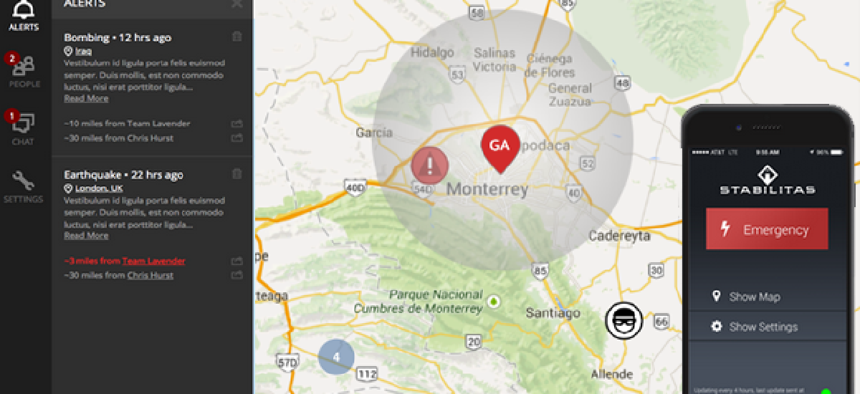New app delivers situational awareness to protect travelers


Connecting state and local government leaders
Stabilitas combines data, maps and local intelligence help organizations operate abroad with greater confidence by knowing the risks they face.
It's a question faced by federal agencies, private companies and universities – by any organization with workers abroad, really: How can we protect staff in areas of political unrest or disaster?
"Let's say you're doing work in the Congo, as I was last summer," posed Chris Hurst. "How do you know it's safe? It turns out that getting that information is really, really difficult."
Hurst recalled that when he was in the Army using a device called Blue Force Tracker that allowed a soldier to see the location of friendly forces in the area. "But what made Force Tracker really innovative was that every soldier could be a sensor of a threat, and every soldier could receive information of a threat," Hurst said. "So with Force Tracker you could see in real-time what was happening around you. There's a lot of power in the concept of a team taking care of itself."
One major limitation of Blue Force Tracker, however, is that it’s a sizeable device installed in a vehicle. According to Hurst, he and several colleagues thought, "There is so much computing power on a smartphone that we should put this functionality on [there]."
The result is Stabilitas, a smartphone app that Hurst and his partners in Stabilitas Ventures, have just moved to closed beta.
Stabilitas combines information from three sources. First, subscribers to the service can upload real-time reports of local conditions. Second, Stabilitas scans more than 3,000 different sources of news, including newspapers articles, social media and reports from the likes of the World Health Organization and the U.S. Geological Survey.
Finally, Stabilitas gathers data from other security managers. "They email each other Excel files with listings of events," said Hurst of the managers at security firms. "We look at this and say, 'This has got to be mapped.' These organizations are great for sharing information. The relationships are there, but the tools are not there. So we are building a tool for that."
The Stabilitas app works on iOS and Android. It automatically tracks the location of subscribers and, if an event is detected within a specified range – whether it be a natural disaster or violence crime – alerts can automatically be sent to users. Users in the field can also use the app to report events or to ask for help.
The key, said Hurst, is to provide very localized intelligence for subscribers that relate to their immediate environs.
"For me, as a risk manager last year in the Congo, what I wanted to see was where my teammates are and what is happening right now," said Hurst, who worked as a security manager for Mercy Corps, a non-profit relief agency. "I didn't want to see a book report about what had happened last week in a different part of the country."
When Hurst worked in the Congo, for example, there was one border guard who was reported to demand sex from women traveling alone. "People around there knew it," he said. "But you wouldn't find that in email reports from a distant security service."
"Overlaying those risks and people together, setting up automatic warnings and bringing in as close to real-time information as we can," Hurst said, is what Stabilitas provides. "Our vision is to give employees and firms the ability to operate with greater confidence by knowing the risks they face and being smart about that."
Rather than serving individual subscribers, Stabilitas is marketing itself to organizations, many of which already have their own global security operations centers, including corporations, universities and government agencies. And Hurst envisions that as subscribers share their data with each other, all will benefit. "It's up to the clients whether they share their data or not, of course," he said, "but it makes the whole ecosystem better."
Stabilitas Ventures currently has four pilot programs under way – including tests at a travel agency, a nonprofit organization and a large university. The company has begun discussions with several federal agencies and plans to open the service to clients in late summer.




